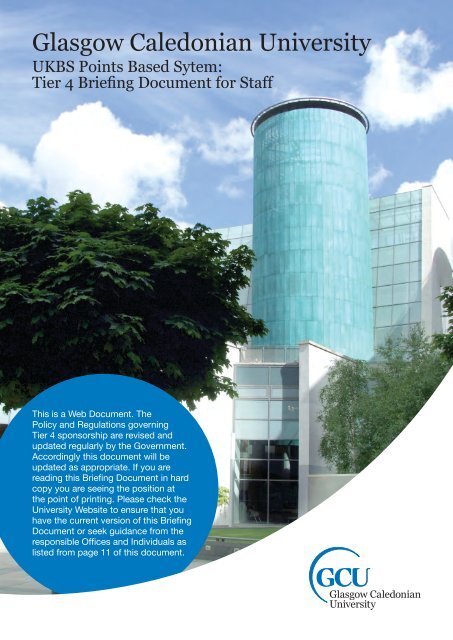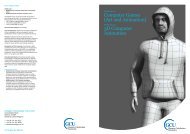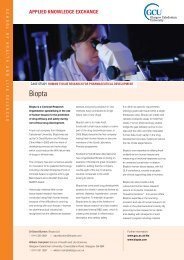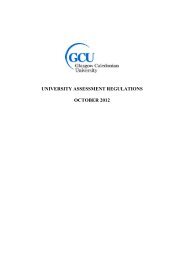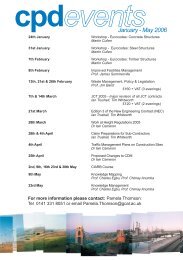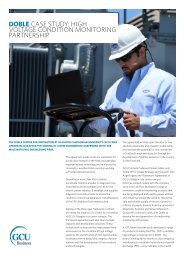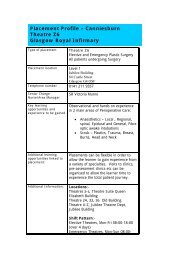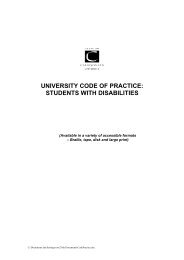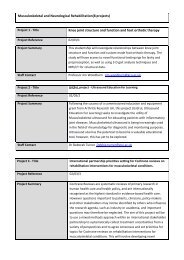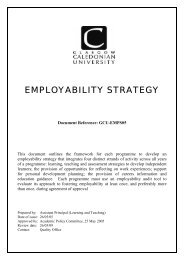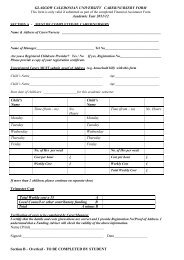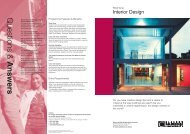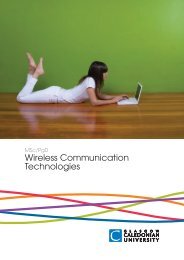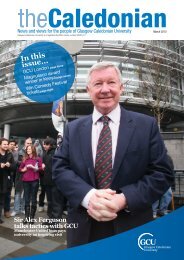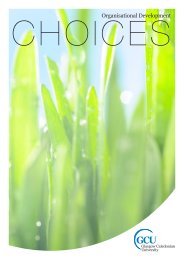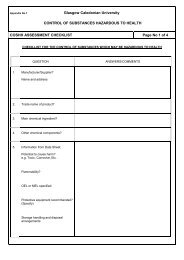Tier 4 Briefing Document for Staff - Glasgow Caledonian University
Tier 4 Briefing Document for Staff - Glasgow Caledonian University
Tier 4 Briefing Document for Staff - Glasgow Caledonian University
Create successful ePaper yourself
Turn your PDF publications into a flip-book with our unique Google optimized e-Paper software.
<strong>Glasgow</strong> <strong>Caledonian</strong> <strong>University</strong><br />
UKBS Points Based Sytem:<br />
<strong>Tier</strong> 4 <strong>Briefing</strong> <strong>Document</strong> <strong>for</strong> <strong>Staff</strong><br />
This is a Web <strong>Document</strong>. The<br />
Policy and Regulations governing<br />
<strong>Tier</strong> 4 sponsorship are revised and<br />
updated regularly by the Government.<br />
Accordingly this document will be<br />
updated as appropriate. If you are<br />
reading this <strong>Briefing</strong> <strong>Document</strong> in hard<br />
copy you are seeing the position at<br />
the point of printing. Please check the<br />
<strong>University</strong> Website to ensure that you<br />
have the current version of this <strong>Briefing</strong><br />
<strong>Document</strong> or seek guidance from the<br />
responsible Offices and Individuals as<br />
listed from page 11 of this document.
Contents<br />
Contents<br />
Page<br />
Introduction 3<br />
Why, How, Where and When 4<br />
International Student Support 5<br />
UKBA Sponsorship Management System 5<br />
Student Attendance and Monitoring Policy 5<br />
English Language 6<br />
Academic Progression 6<br />
Changes Course within GCU 6<br />
Change Sponsor 6<br />
Student Work Placement 7<br />
Student Working Hours 7<br />
Dissertation Write up Period 8<br />
Student Absence 9<br />
Examinations Resits 9<br />
Sponsorship Ends 10<br />
International Student Contacts 11<br />
Page | 2
In<strong>for</strong>mation <strong>Document</strong>: <strong>Tier</strong> 4 International Students<br />
Introduction<br />
This document is intended as an in<strong>for</strong>mation guide. It will assist staff in providing a<br />
greater understanding of the processes involved when recruiting and retaining tier 4<br />
international students using the Points Based Immigration system (PBS).<br />
The PBS was designed by the UK government and is the means of regulating<br />
immigration to the United Kingdom from outside the European Economic Area<br />
(EEA). The scheme was phased in between 2008 and 2010 and is administered by<br />
the UK Border Agency (UKBA). The PBS consists of five separate tiers, 1 through to<br />
5. <strong>Tier</strong> 4 is the route used <strong>for</strong> migrants who want to study full time in the UK.<br />
<strong>Glasgow</strong> <strong>Caledonian</strong> <strong>University</strong> (GCU) is licensed by the UKBA to sponsor<br />
successful international applicants who wish to enter the UK <strong>for</strong> the purposes of full<br />
time higher education study. GCU must comply with the appropriate tier 4<br />
regulations under which it is licensed. Failure to do so may result in the suspension<br />
of and/or withdrawal of its sponsors licence. GCU, in common with all other UK<br />
Universities, currently enjoys Highly Trusted Sponsor (HTS) status. In order to retain<br />
its HTS status, which is renewed annually, GCU must meet the UKBA HTS eligibility<br />
requirements introduced in September 2011.<br />
Page | 3
Why, How, Where and When<br />
Why do we sponsor international students<br />
At GCU we provide an environment which enables the student, both home and<br />
international, to flourish and realise their full potential by offering a variety of<br />
innovative and specialised programmes of study with world class facilities and award<br />
winning student support. During Academic session 2010/11 recruitment and<br />
sponsorship of tier 4 students generated income of £10.2m. This income helps us<br />
maintain our financial independence by decreasing our reliance on Scottish Funding<br />
Council (SFC) income.<br />
How do we sponsor international students<br />
All initial applications from potential students are processed by the Student<br />
Recruitment and Admissions Service. Any student who wishes to come to the UK<br />
under tier 4 of the PBS must obtain a visa be<strong>for</strong>e they travel. A student cannot apply<br />
<strong>for</strong> a visa or extension of stay without a Confirmation of Acceptance <strong>for</strong> Studies<br />
(CAS) which will be issued by the <strong>University</strong> under its HTS license. A student will<br />
only be assigned a CAS when they have been issued with an unconditional offer of a<br />
place on a course and paid a fees deposit. Students who are already in the UK<br />
under tier 4 can apply <strong>for</strong> an extension of their current permission to stay; this is<br />
called further leave to remain and they require and extension CAS. Extension CAS<br />
are processed by the Student Records team.<br />
Where do we recruit international students from<br />
We recruit international students from countries out with the EEA. Students from<br />
within the EEA do not require a tier 4 visa. Below is a link listing the EEA countries<br />
and members. http://en.wikipedia.org/wiki/European_Economic_Area#Membership<br />
When do we sponsor international students<br />
We can sponsor an international student anytime as long as their permission to be in<br />
the UK is valid. That is, the “valid from date” on their visa precedes the course start<br />
date on their CAS. It is not possible <strong>for</strong> a student to have a visa which has a “valid<br />
from date” which is after the course start date. There are traditionally 2 windows<br />
when the majority of international students arrive in the UK and enrol on their course;<br />
September and February.<br />
Below is a link to the latest <strong>Tier</strong> 4 UKBA sponsor guidance which specifies the<br />
regulatory framework within which the <strong>University</strong> must operate in order to meet its<br />
statutory requirements and obligations as an HTS institution.<br />
http://www.ukba.homeoffice.gov.uk/sitecontent/documents/employersandsponsors/p<br />
bsguidance<br />
Page | 4
International Student Support/Points of Contact<br />
How do we support international students<br />
Support <strong>for</strong> staff with tier 4 and international student responsibilities should be<br />
directed in the first instance to Brian Fitzsimmons the GCU/UKBA Compliance<br />
Officer on x 1066 or at b.fitzsimmons@gcu.ac.uk<br />
Support <strong>for</strong> tier 4 and international students at the point of entry and at the point of<br />
contact is provided by International Student Support Service (ISSS) isss@gcu.ac.uk<br />
Members of staff should refer international students, in the first instance, to the team<br />
at ISSS. They will provide support on a wide range of issues and are the only team<br />
fully qualified to give advice on issues relating to student or other types of visas. It<br />
is extremely important that any in<strong>for</strong>mation or advice given to students regarding tier<br />
4 or other visas is dispensed only by ISSS.<br />
More in<strong>for</strong>mation on ISSS can be found at<br />
http://www.gcu.ac.uk/student/international/index.html<br />
Complying with our UKBA <strong>Tier</strong> 4 responsibilities<br />
UKBA Sponsorship Management System<br />
Authorised members of staff use the UKBA Sponsorship Management System<br />
(SMS) to carry out the day to day administrative functions necessary to comply with<br />
our sponsor obligations and duties and to communicate in<strong>for</strong>mation to UKBA. The<br />
SMS is a Home Office designed IT system which allows sponsors like GCU to<br />
ensure compliance by <strong>for</strong> example assigning CAS and maintaining an audit trail of<br />
in<strong>for</strong>mation reported back to UKBA.<br />
All members of staff must be compliant when dealing with issues relating to or<br />
arising from tier 4 international students. Should you be in any doubt please contact<br />
Brian Fitzsimmons the GCU/UKBA Compliance Officer on x 1066 or at<br />
b.fitzsimmons@gcu.ac.uk<br />
Student Attendance, Monitoring and Reporting<br />
It is the responsibility of the <strong>University</strong> as the tier 4 sponsor to monitor the progress<br />
and attendance of all sponsored students during the length of their programme of<br />
study at GCU. This includes students at all levels; Undergraduate, Post Graduate<br />
Taught and Post Graduate Research. It is also the responsibility of the <strong>University</strong> to<br />
Page | 5
eport to UKBA any failure on the student’s behalf in fulfilling their requirements as<br />
set out in the UKBA sponsors guidance at:<br />
http://www.ukba.homeoffice.gov.uk/sitecontent/documents/employersandsponsors/p<br />
bsguidance <br />
and the <strong>University</strong> Guidance on Student Attendance, Monitoring and Reporting at:<br />
http://www.gcu.ac.uk/guidelinesandpolicies/<br />
English Language Requirements<br />
All students who are issued a CAS must be competent in English language at a<br />
minimum of B2 on the Common European Framework of Reference <strong>for</strong> Language<br />
(CEFR). All Higher Education Institutions are allowed to choose their own way of<br />
assessing that competency. However they must ensure that all students are<br />
proficient to level B2 in each of the four components; speaking, listening, reading<br />
and writing.<br />
Academic Progression<br />
Academic progression is not a concern if this is the student’s first programme of<br />
study in the UK. However it becomes a concern if it is not. To show academic<br />
progression the student’s new programme of study should normally be above the<br />
level of the previous programme of study <strong>for</strong> which the UKBA gave them permission<br />
to stay in the UK as a student. UKBA recognise that academic progression may<br />
involve further study at the same level. However in such cases the new programme<br />
of study must complement the previous one. It may also be the case that in rare<br />
circumstances Academic Progression may involve further study at a lower level.<br />
Changing a Programme of Study<br />
A student is allowed to change their programme of study without in<strong>for</strong>ming or<br />
seeking permission from UKBA as long as they stay with the same sponsor and as<br />
long as they meet the admissions criteria. If the new programme is longer than the<br />
previous then the student will have to apply <strong>for</strong> an extension of their permission to<br />
stay. This can be done immediately or shortly be<strong>for</strong>e their existing permission<br />
expires.<br />
If the students new programme is shorter than the previous then UKBA must be<br />
in<strong>for</strong>med immediately.<br />
Changing Sponsor (Institution)<br />
When a student changes to a new programme of study with a different sponsor they<br />
must apply again under tier 4, with a CAS from their new sponsor. They must not<br />
Page | 6
start their new programme until UKBA have approved their application unless the<br />
new sponsor has HTS status and has assigned them a CAS and they applied to<br />
UKBA be<strong>for</strong>e their existing permission to stay expired.<br />
If a student leaves their original sponsor be<strong>for</strong>e UKBA approves their new application<br />
they may not be able to return to the course with their original sponsor if UKBA<br />
refuse their application.<br />
Student Work Placement<br />
<strong>Tier</strong> 4 students may undertake work placement provided that it is approved by the<br />
<strong>University</strong> and is clearly defined as part of the programme structure. The work<br />
placement must not exceed 50% of the total length of the programme and it must<br />
also be an assessable part of the programme. For example if the course is a year in<br />
length then the work placement element cannot be more than 6 months in total. The<br />
work placement period can be split up into sections but the important principle is that<br />
the total must never exceed 50% of the total length of the programme.<br />
The only exception to the 50% rule is where there is a statutory requirement <strong>for</strong> a<br />
programme to contain a work placement period which exceeds the 50% limit.<br />
The work placement element can be part time or full time, paid or unpaid (not<br />
voluntary), in country or out of country.<br />
It is the responsibility of the <strong>University</strong> to ensure that all placement providers and<br />
locations have been properly vetted in advance of any students being placed. In<br />
vetting the providers, Schools and Departments must ensure that they are fully<br />
compliant with EU and UK law and those providers are fully aware of the<br />
requirement to comply with UKBA reporting regulations.<br />
The <strong>University</strong> will be responsible <strong>for</strong> the student throughout the entirety of the work<br />
placement period and must continue to comply with all their sponsor duties during<br />
this time. As such the <strong>University</strong> must ensure that the student continues to comply<br />
with the requirements of their programme of study including attendance and taking a<br />
full and assessable part in their placement. It is also the responsibility of the<br />
<strong>University</strong> to ensure that the appropriate monitoring and where necessary reporting<br />
procedures are in place. These procedures must be auditable and fully documented.<br />
Student Working Hours<br />
During term time and out with any placement period tier 4 students are allowed to<br />
work part time which is up to a maximum of 20 hours in any single week. This is not<br />
an average of 20 hours but a fixed maximum <strong>for</strong> any single week.<br />
Page | 7
During vacation time and the visa grace period tier 4 students are allowed to work<br />
full time. Full time is whatever the employer deems as long as they are not<br />
contravening UK and EU law and are remaining UKBA compliant.<br />
During the placement period a tier 4 student can, in addition to whatever hours they<br />
are contracted to work with their placement provider, work part time.<br />
Vacation time is identified in the trimester calendar as Inter Semester breaks and<br />
Spring break. http://www.gcu.ac.uk/theuniversity/calendar/<br />
Visa grace period is the time at the end of a student’s visa (over and above the<br />
length of their course) which is granted by UKBA to allow students to work full time<br />
and to take care of issues such as resits, graduation, personal affairs etc.<br />
Dissertation/Final Project Write Up Period<br />
In line with UKBA guidance tier 4 students are required to be in attendance at GCU<br />
<strong>for</strong> the full duration of the length of their programme of study. These dates are<br />
clearly stated in the students CAS as the course start date and the course end date.<br />
However tier 4 students can request to write up and submit their dissertation from<br />
their home country, from another address in the UK or from their term time address<br />
in the UK without attendance.<br />
The granting of such requests must be the exception and not the rule.<br />
The School will approve or refuse the request based on UKBA guidance and their<br />
own criteria, usually academic. If the request is approved then the School must be<br />
confident that it can maintain its sponsor duties towards the student during this<br />
period thus maintaining compliance and apply the following:<br />
Write up and submit from home country<br />
Be<strong>for</strong>e student departure both parties must agree a study plan which they consider<br />
reasonable and must include a schedule of agreed contacts; could include email,<br />
telephone, face to face, video conferencing etc. The student’s records must be<br />
updated to include the change of term time address (ISIS).<br />
An example of a schedule of agreed contacts (to be included in the study plan)<strong>for</strong> a<br />
12 week dissertation write up period could include weekly progress reports via email,<br />
4 weekly submission of works via email and a video conference or telephone call<br />
every 6 weeks; this is <strong>for</strong> both parties to decide so long as it’s reasonable and<br />
auditable.<br />
UKBA will be in<strong>for</strong>med. The student’s visa would be revoked. Once out of the UK<br />
the student would require another visa should they wish to re-enter.<br />
Page | 8
Write up and submit from elsewhere in the UK<br />
As above with regards to the study plan and the agreed schedule of contacts.<br />
However in the above scenario it may not be reasonable to ask <strong>for</strong> face to face<br />
meetings but in this scenario it certainly would be.<br />
The student’s records must be updated to show the change of term time address<br />
(ISIS).<br />
UKBA would be in<strong>for</strong>med that the student has changed address within the UK. Their<br />
visa status would remain intact.<br />
Write up and submit from term time address but without attendance<br />
As above with regards to the study plan and agreed schedule of contacts. However<br />
with this scenario there would a requirement to have face to face meetings on a<br />
regular basis.<br />
There is no requirement to in<strong>for</strong>m UKBA.<br />
IN ALL SCENARIOS LISTED ABOVE THE MEASURES AGREED MUST BE<br />
AUDITABLE AND FULLY DOCUMENTED AND STORED IN A SECURE<br />
ENVIRONMENT. A COPY OF ALL AGREEMENTS, INCLUDING THE INITIAL<br />
REQUEST FROM THE STUDENT, MUST BE KEPT IN THE STUDENTS FILE.<br />
Student Absence <strong>for</strong> a prolonged period<br />
Where a student is going to be absent <strong>for</strong> a prolonged period the <strong>University</strong> can<br />
classify this as an Authorised Absence. However it is <strong>for</strong> the <strong>University</strong> to judge<br />
whether or not the student will be able to pick up and resume their studies without<br />
the need to repeat previous study. If repeat study is required then the student will be<br />
advised to defer or take time out from their studies. In either case UKBA will need to<br />
be in<strong>for</strong>med. This will result in the student’s visa being revoked and they will be<br />
required to return home. When and if a student wishes to resume their studies they<br />
will have to apply <strong>for</strong> another CAS in order to make a new visa application.<br />
If a student requests an authorised absence, is refused and takes it upon themselves<br />
to be absent then the School has to follow due process. The student will have to be<br />
reported to UKBA as they have broken the conditions laid out in the UKBA tier 4<br />
guidance.<br />
The definition of a prolonged period is <strong>for</strong> the School to make. It could be the case<br />
that <strong>for</strong> a weak student a prolonged period absent from their studies could be as little<br />
Page | 9
as one week and <strong>for</strong> a stronger student it could be 3 weeks; this is <strong>for</strong> the School to<br />
decide.<br />
Examination Resits<br />
<strong>Tier</strong> 4 students are normally permitted to re-sit examinations or repeat any part of<br />
their course no more than twice per module; extra attempts are at the discretion of<br />
the Assessment Board.<br />
If a student is required to repeat modules in the corresponding semester of the<br />
following year and their attendance is not required <strong>for</strong> the remainder of the current<br />
year then the student will be required to go home and re-apply <strong>for</strong> entry at the next<br />
most suitable date. A new CAS will also be required.<br />
If the students permission to stay expires be<strong>for</strong>e they finish the re-sit or repeat they<br />
must apply to extend it be<strong>for</strong>e their current permission expires. The School is<br />
responsible <strong>for</strong> making the decision as to whether or not to continue sponsoring the<br />
student based on their assessment of their ability to pass the course.<br />
Sponsorship Ends<br />
The <strong>University</strong> has a duty to in<strong>for</strong>m UKBA of any student who <strong>for</strong>mally withdraws or<br />
is withdrawn from their studies or who defers their studies. UKBA must be told within<br />
10 working days of them doing so.<br />
If the <strong>University</strong> stops sponsoring a student <strong>for</strong> any other reason UKBA must also be<br />
in<strong>for</strong>med within 10 working days.<br />
If a student decides to defer their studies after arriving in the UK then their<br />
permission to stay will no longer be valid as there are not actively studying. As well<br />
as in<strong>for</strong>ming UKBA the student must be advised to leave the country and when they<br />
are ready to resume their studies, apply <strong>for</strong> a new CAS to make a fresh visa<br />
application.<br />
Page | 10
UKBA Compliance<br />
<strong>Staff</strong> enquiries should be directed to the <strong>University</strong>’s UKBA Compliance Officer Brian<br />
Fitzsimmons at b.fitzsimmons@gcu.ac.uk or on x1066<br />
International Student Support Service<br />
The first point of contact <strong>for</strong> all International student enquiries is the International<br />
Student Support Service (ISSS) which is located next to the George Moore<br />
Reception area. ISSS can be contacted at isss@gcu.ac.uk or on x 1244.<br />
Student Records<br />
Student Records can be contacted at studentrecords@gcu.ac.uk or on x 3338<br />
Page | 11


